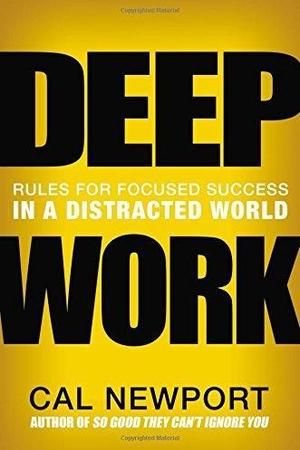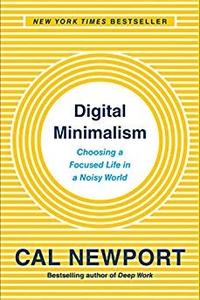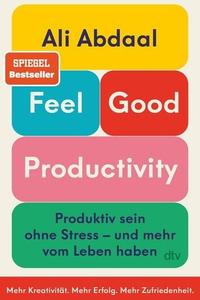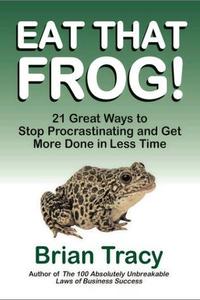
Deep Work by Cal Newport: Summary & Notes
by Cal Newport
In One Sentence
In an economy that rewards rare and valuable skills, the ability to perform distraction-free, cognitively demanding work—deep work—is becoming both increasingly valuable and increasingly rare.
Key Takeaways
- Deep work is professional activities performed in distraction-free concentration that push cognitive capabilities
- Shallow work is non-cognitively demanding, logistical-style tasks often performed while distracted
- Deep work is becoming rare just as it's becoming more valuable—a huge opportunity
- Schedule deep work blocks like you schedule meetings—protect them ruthlessly
- Embrace boredom: if you constantly seek stimulation, you train your brain against deep focus
- Quit social media (or at least use it intentionally) to reclaim attention
Summary
Newport makes the case for cultivating time to do “deep work” - times where you are concentrated solely on one task, and how powerful this ability can be in the modern world. He also outlines how you can go about growing the amount of deep work in your life. This book had a large impact on me, in that I now constantly think about how I can increase the amount of time where I spend doing “deep work” of some sort, or more generally, how much I spend in a flow state (see Flow by Csikszentmihalyi). Important read for anyone in a profession particularly prone to shallow work distractions.
Who Should Read This Book
- Knowledge workers who feel fragmented by constant distractions
- Professionals who want to produce higher quality work in less time
- Students and researchers needing to develop focused thinking abilities
- Anyone feeling their attention span has deteriorated due to technology
FAQ
What is deep work vs shallow work?
Deep work is cognitively demanding work performed in distraction-free concentration—it creates new value, improves skills, and is hard to replicate. Shallow work is logistical, non-demanding tasks like email that don't require focused attention and don't create much value.
How do I schedule deep work?
Newport suggests four strategies: 1) Monastic—eliminate all distractions radically. 2) Bimodal—dedicate defined stretches to deep work. 3) Rhythmic—create daily deep work habits at set times. 4) Journalistic—fit deep work in wherever you can. Most people do best with rhythmic scheduling.
Why should I quit social media?
Newport argues social media fragments attention and trains your brain for distraction. The "any-benefit" mindset justifies usage for minor benefits while ignoring major costs. Instead, apply the "craftsman approach": only adopt tools if benefits substantially outweigh costs for what matters most.
📖 Chapter-by-Chapter Breakdown
Click to expand the full detailed notes for every chapter →
📖 Chapter-by-Chapter Breakdown
Click to expand the full detailed notes for every chapter →
Notes
Introduction
- Deep Work: Professional activities performed in a state of distraction-free concentration that push your cognitive capabilities to their limit. These efforts create new value, improve your skill, and are hard to replicate.
- The reason knowledge workers are losing their familiarity with deep work is well established: network tools. This is a broad category that captures communication services like e-mail and SMS, social media networks like Twitter and Facebook, and the shiny tangle of infotainment sites like BuzzFeed and Reddit.
- Shallow Work: Noncognitively demanding, logistical-style tasks, often performed while distracted. These efforts tend to not create much new value in the world and are easy to replicate.
- The Deep Work Hypothesis: The ability to perform deep work is becoming increasingly rare at exactly the same time it is becoming increasingly valuable in our economy. As a consequence, the few who cultivate this skill, and then make it the core of their working life, will thrive.
Part I: The Idea
Chapter One: Deep Work is Valuable
- Two Core Abilities for Thriving in the New Economy
- 1. The ability to quickly master hard things.
- 2. The ability to produce at an elite level, in terms of both quality and speed.
- These two abilities depend on your ability to do deep work.
- High-Quality Work Produced = (Time Spent) x (Intensity of Focus)
Chapter Two: Deep Work is Rare
- The Principle of Least Resistance: In a business setting, without clear feedback on the impact of various behaviors to the bottom line, we will tend toward behaviors that are easiest in the moment.
- Busyness as Proxy for Productivity: In the absence of clear indicators of what it means to be productive and valuable in their jobs, many knowledge workers turn back toward an industrial indicator of productivity: doing lots of stuff in a visible manner.
Chapter Three: Deep Work is Meaningful
- The more flow experiences that occur in a given week, the higher the subject’s life satisfaction. Human beings, it seems, are at their best when immersed deeply in something challenging.
- Deep work is an activity well suited to generate a flow state (the phrases used by Csikszentmihalyi to describe what generates flow include notions of stretching your mind to its limits, concentrating, and losing yourself in an activity—all of which also describe deep work). And as we just learned, flow generates happiness.
- You don’t need a rarified job; you need instead a rarified approach to your work.
Part II: The Rules
Rule #1: Work Deeply
- You have a finite amount of willpower that becomes depleted as you use it.
- The key to developing a deep work habit is to move beyond good intentions and add routines and rituals to your working life designed to minimize the amount of your limited willpower necessary to transition into and maintain a state of unbroken concentration.
- The monastic philosophy of deep work scheduling: This philosophy attempts to maximize deep efforts by eliminating or radically minimizing shallow obligations. Practitioners of the monastic philosophy tend to have a well-defined and highly valued professional goal that they’re pursuing, and the bulk of their professional success comes from doing this one thing exceptionally well.
- The bimodal philosophy of deep work: This philosophy asks that you divide your time, dedicating some clearly defined stretches to deep pursuits and leaving the rest open to everything else.
- The rhythmic philosophy: This philosophy argues that the easiest way to consistently start deep work sessions is to transform them into a simple regular habit. The goal, in other words, is to generate a rhythm for this work that removes the need for you to invest energy in deciding if and when you’re going to go deep.
- The journalistic philosophy: any time you can find some free time, you switch into deep work mode and hammer away. It requires being able to shift into deep work mode at a moment’s notice, and is not for the deep work novice.
- You should build a ritual to prepare for deep work, and it should include the following:
- Where you’ll work and how long.
- How you’ll work once you start to work.
- How you’ll support your work.
- The grand gesture: a tool for encouraging deep work where you radically change your environment, invest significant effort or money, all dedicated towards a deep work task (increasing its significance).
- At the end of the workday, shut down your consideration of work issues until the next morning. This is necessary to reset your mind.
- This should be tied to a shutdown ritual which ensures you have a step-by-step plan in place to complete the next part of the project.
Rule #2: Embrace Boredom
- Instead of scheduling the occasional break from distraction so you can focus, you should instead schedule the occasional break from focus to give in to distraction.
- Schedule in advance when you’ll use the Internet, and then avoid it altogether outside these times.
Rule #3: Quit Social Media
- You should quit social media and begin evaluating the network tools you use much more strictly.
- The Any-Benefit Approach to Network Tool Selection: You’re justified in using a network tool if you can identify any possible benefit to its use, or anything you might possibly miss out on if you don’t use it.
- The Craftsman Approach to Tool Selection: Identify the core factors that determine success and happiness in your professional and personal life. Adopt a tool only if its positive impacts on these factors substantially outweigh its negative impacts.
- The Law of the Vital Few: In many settings, 80 percent of a given effect is due to just 20 percent of the possible causes.
- You should also put more thought into your leisure time - give yourself something meaningful to do.
- Schedule every minute of your day: to accomplish deep work, you must treat your time with respect, and this is a good first step. Break your day into blocks, and assign activities.
Rule #4: Drain the Shallows
- For shallow activities: batch them in small groups (2-3 per day).



